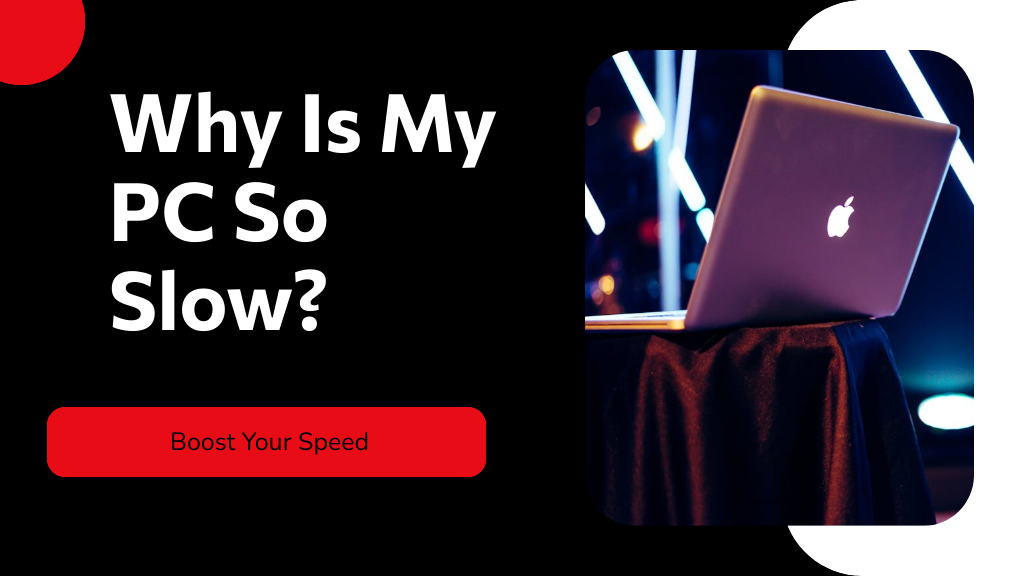
If your PC is slow, it could be due to several factors. Outdated hardware, like an old CPU or HDD, limits performance. Insufficient RAM and excessive background applications also contribute to sluggishness. Fragmented files and malware can further exacerbate the issue. Overheating components from dust buildup might be throttling your system. Regular maintenance, including updates and cleaning, can greatly improve speed. Keep exploring to uncover effective solutions for enhancing your computer's performance.
Hardware Limitations
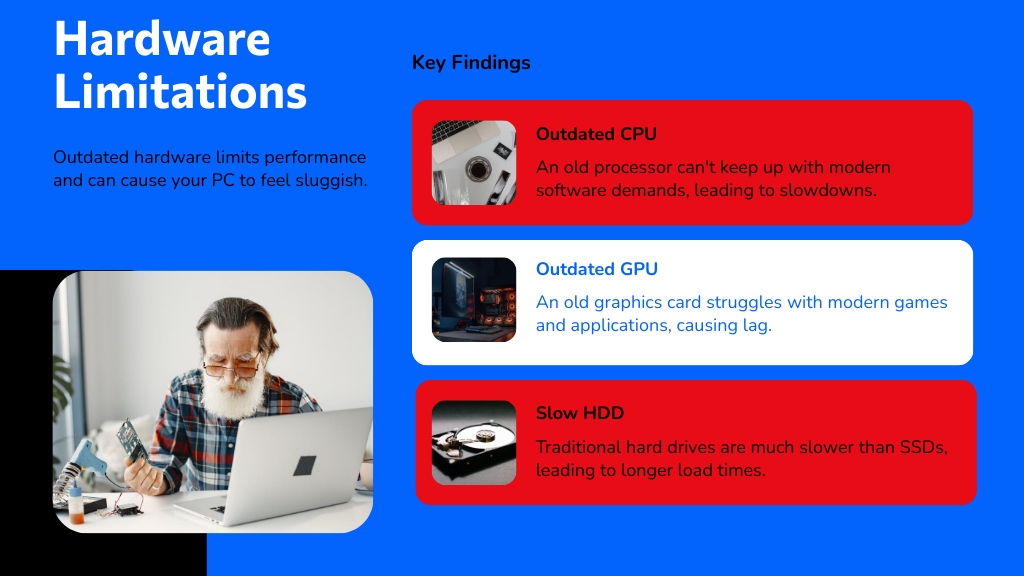
One of the primary reasons your PC might feel sluggish is due to hardware limitations. If your computer's components aren't up to the task, you'll notice your computer running slow, especially when multitasking or running demanding applications. The processor could be outdated, limiting how quickly it processes tasks. Additionally, older graphics cards may struggle with modern software, causing lag.
Storage drives also play an important role; traditional hard drives are considerably slower than solid-state drives, which can lead to longer load times. If you're asking yourself, "Why is my computer so slow?" consider upgrading your hardware. Investing in a better CPU, GPU, or SSD can dramatically enhance performance and eliminate those frustrating slowdowns.
Insufficient RAM
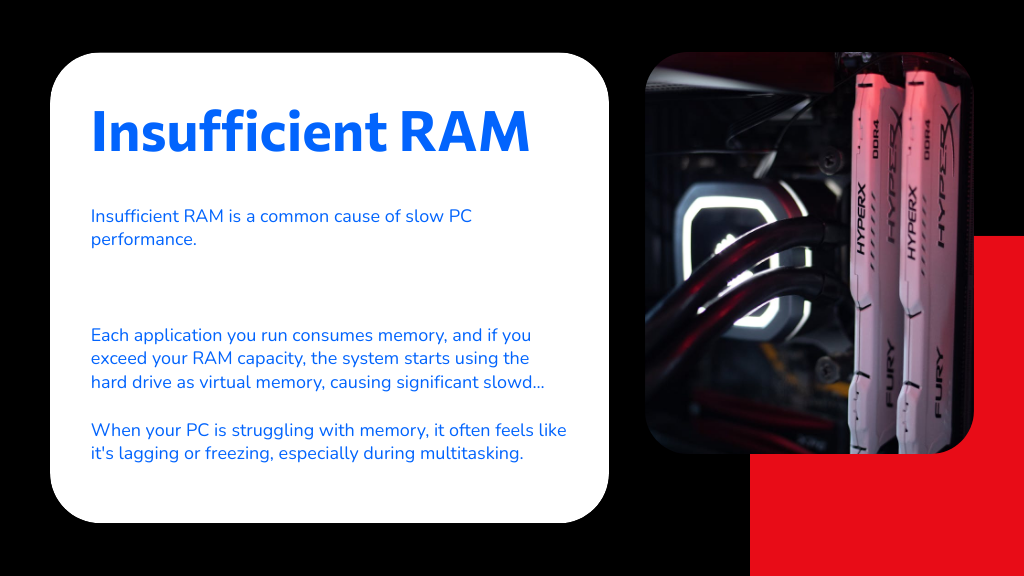
If your PC's performance is lagging, insufficient RAM might be the culprit. Each application you run consumes memory, and if you exceed your RAM capacity, your system will slow down. Fortunately, upgrading your RAM is a straightforward solution that can considerably enhance your computer's speed and efficiency.
RAM Capacity Limitations
Insufficient RAM can greatly hinder your PC's performance, especially when running multiple applications or demanding software. You might notice your computer slow down considerably, leading you to wonder, “Why is my computer so slow?” When your system runs out of available RAM, it relies on the much slower hard drive for memory tasks, causing lag.
Consider these factors:
- Running too many programs simultaneously
- Opening large files or resource-heavy applications
- Background processes consuming RAM
All these can lead to frustrating delays. To guarantee smooth operation, monitor your RAM usage and close unnecessary applications. Understanding your RAM capacity limitations is essential for maintaining peak performance and preventing those slowdowns.
Upgrading Options Available
Running low on RAM can greatly affect your PC's performance, but upgrading your memory is a straightforward solution that can make a noticeable difference.
If you're asking yourself, "Why is my computer so slow?", it's likely due to insufficient RAM for your tasks. To fix this, start by checking your system's specifications and determining the maximum RAM capacity it supports.
You can purchase compatible RAM sticks online or at a local computer store. Installation is usually simple; just guarantee you power off the PC and follow the manufacturer's guidelines.
Once upgraded, you'll notice improved multitasking and faster application loading times, effectively addressing how to fix a slow computer. A RAM boost could be the key to reviving your PC's performance.
Outdated or Failing Hard Drive
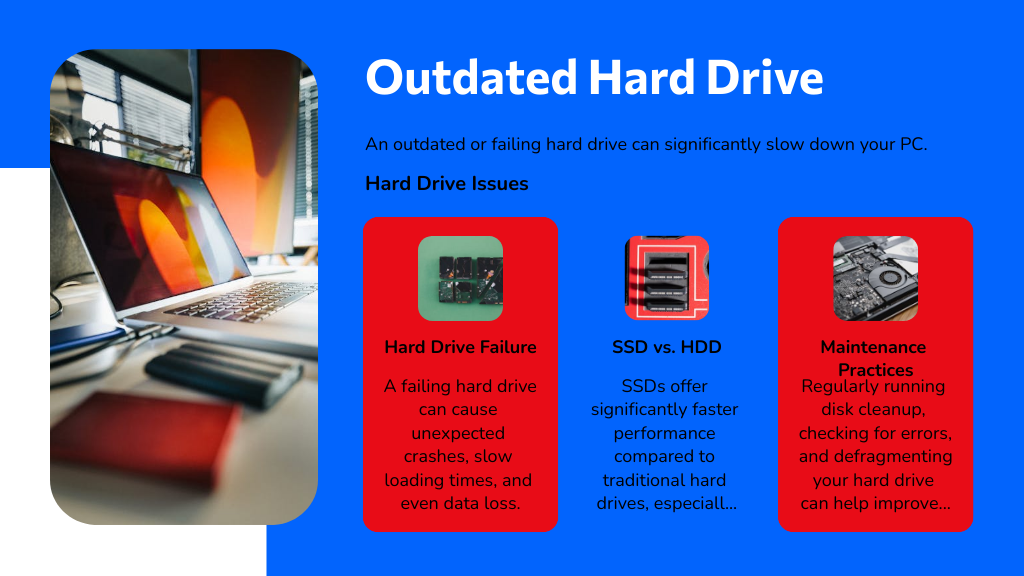
If your PC is slow, an outdated or failing hard drive might be the culprit. You'll want to look for signs of hard drive failure, understand the performance differences between SSDs and HDDs, and implement regular maintenance practices. Addressing these factors can considerably improve your system's responsiveness.
Signs of Hard Drive Failure
How can you tell if your hard drive is failing? Recognizing the signs early can prevent data loss and keep your computer running smoothly. If your computer's running slow, it might be due to hard drive issues. Here are a few signs to watch for:
- Unusual noises, like clicking or grinding
- Frequent crashes or error messages
- Slow file access and loading times
If you notice any of these symptoms, it's essential to back up your data immediately. Delaying action could lead to further issues. Understanding these signs can help answer the question, "Why is my computer so slow?" Taking proactive measures will guarantee your system remains functional and efficient.
SSD vs. HDD Performance
When considering the performance of your computer, have you ever wondered how SSDs stack up against traditional HDDs? The difference in speed and responsiveness is significant. SSDs use flash memory, enabling faster data access and reduced boot times, while HDDs rely on spinning disks, which can lead to slower read/write speeds.
If you're asking, "Why is my computer running slow?" it might be due to an outdated HDD. In a direct SSD vs. HDD performance comparison, SSDs typically outperform HDDs by a wide margin, especially for tasks involving large files or multiple applications.
Upgrading to an SSD can breathe new life into your system, drastically improving load times and overall performance, making it a worthwhile investment for any user experiencing slowdowns.
Regular Maintenance Practices
Upgrading to an SSD can greatly enhance your PC's performance, but even with this improvement, regular maintenance practices are essential to prevent slowdowns associated with outdated or failing hard drives. If you're wondering why your computer is so slow, consider these maintenance tips to keep your system running smoothly:
- Run Disk Cleanup: Regularly remove unnecessary files and programs.
- Check for Errors: Use built-in tools to scan and fix disk errors.
- Defragment Your Drive: For HDDs, defragmentation can optimize file storage.
Software Bloat
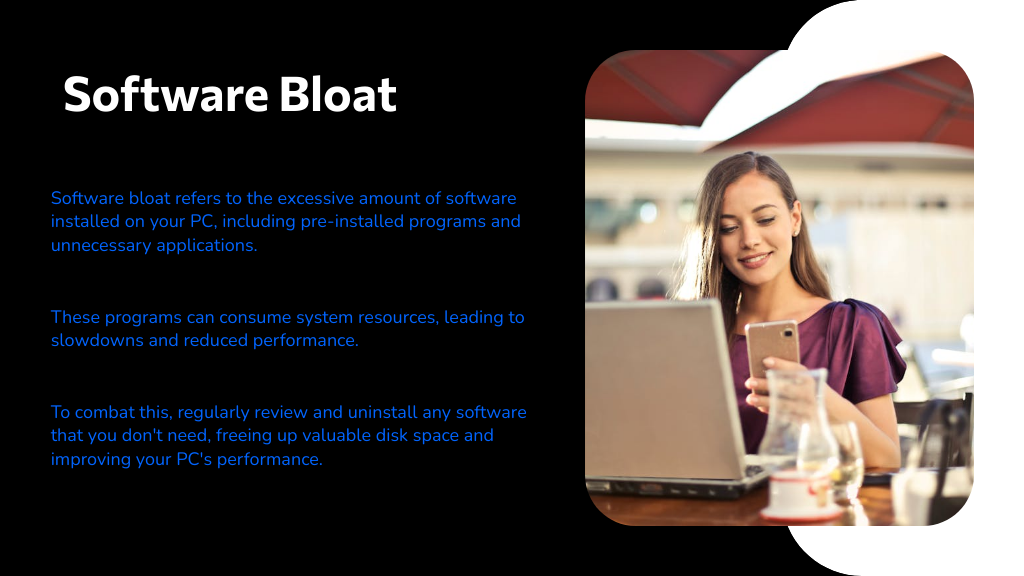
Ever wondered why your PC feels sluggish despite having decent hardware? One major culprit could be software bloat. This term refers to the excessive amount of software, including pre-installed programs and unnecessary applications, that can consume your system's resources. When your PC's hard drive fills up with these programs, it leads to longer load times, reduced performance, and an overall sluggish experience.
You might find your computer running slow simply because too many applications are running in the background or taking up valuable storage space. To combat this, regularly review and uninstall any software you don't need. Streamlining your application list can greatly improve your PC's responsiveness and help answer the question, "Why is my computer so slow?"
Background Processes
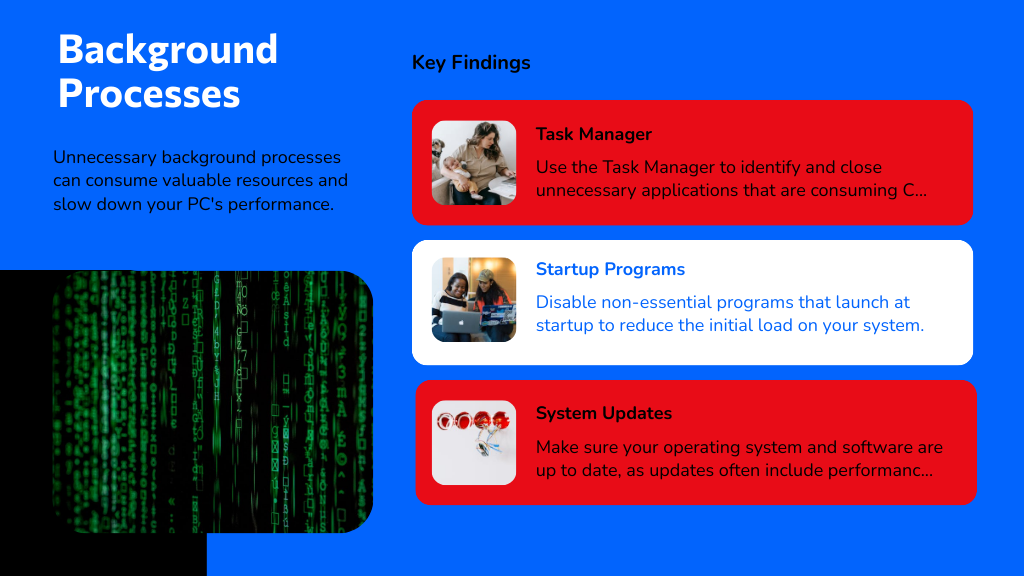
Although you mightn't notice them, background processes can greatly impact your PC's performance. When your computer's running slow on Windows 10, these processes often hog resources, leading to sluggishness. Identifying and managing them is crucial to enhance speed.
- Task Manager: Check for unnecessary applications consuming CPU and RAM.
- Startup Programs: Disable non-essential programs that launch at startup.
- System Updates: Verify background updates aren't slowing your system down.
Malware and Viruses
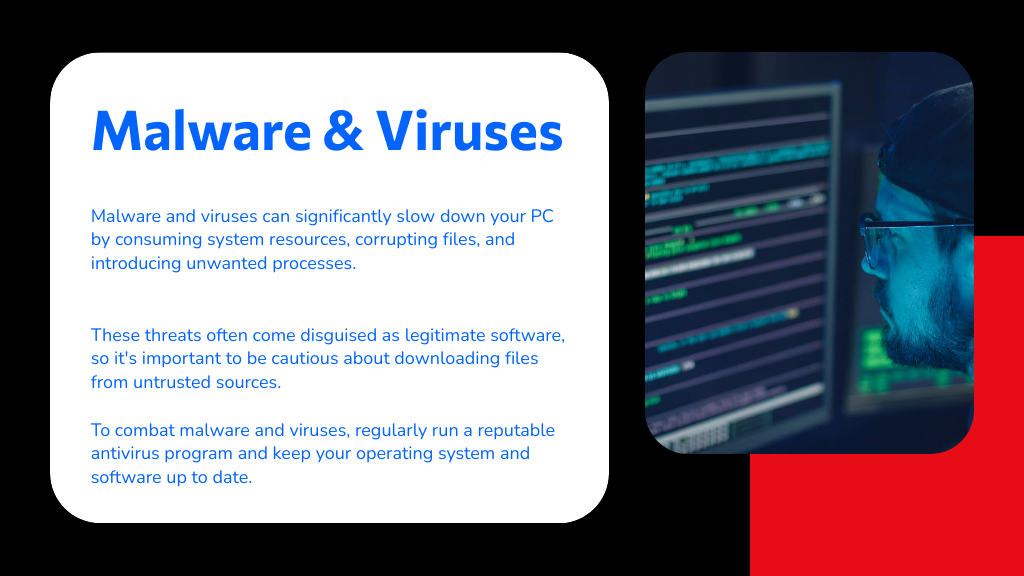
Malware and viruses can wreak havoc on your PC's performance, causing considerable slowdowns that can be difficult to pinpoint. These malicious programs consume system resources, corrupt files, and introduce unwanted processes, all contributing to the question, "Why is my computer so slow?"
You might notice increased loading times, unexpected crashes, or frequent pop-up ads. To combat this, regularly run a reputable antivirus program to scan for and remove any threats. Keeping your operating system and software up to date also helps close security vulnerabilities that malware exploits.
Additionally, be cautious about downloading files or clicking on links from untrusted sources. By staying proactive, you can considerably enhance your PC's performance and minimize the impacts of malware and viruses.
Fragmented Hard Drive
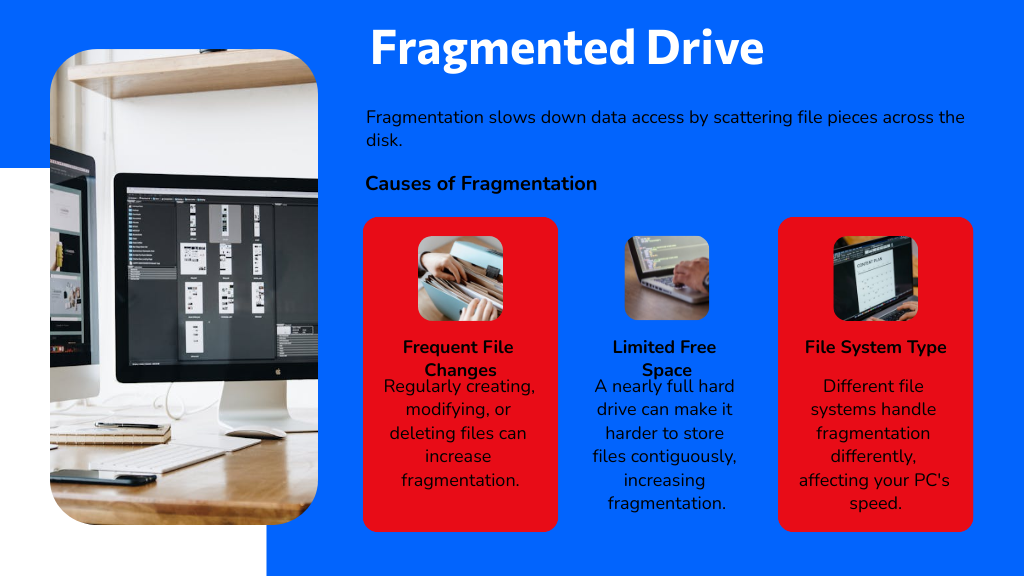
A fragmented hard drive can greatly slow down your PC's performance. This fragmentation occurs when files are stored in non-contiguous spaces, making it harder for your system to access them efficiently. Using defragging tools can help reorganize these files, improving speed and responsiveness.
Causes of Fragmentation
When files are repeatedly created, modified, and deleted on your hard drive, fragmentation can occur, leading to slower performance. This fragmentation means that file pieces are scattered across the disk, forcing your computer to work harder to access them.
Here's why your computer might be very slow:
- Frequent File Changes: Regularly updating or removing files increases fragmentation.
- Limited Free Space: A nearly full hard drive can exacerbate fragmentation, making it harder for files to be stored contiguously.
- File System Type: Some file systems handle fragmentation better than others, impacting your PC's speed.
If you're wondering why your computer is so slow, addressing fragmentation is an essential step in restoring its performance.
Defragging Tools Available
To combat fragmentation and improve your PC's performance, utilizing defragging tools is key. These tools reorganize your hard drive, placing fragmented files together for quicker access.
Windows has a built-in defragmentation tool that's easy to use; just search for "Defragment and Optimize Drives" in the Start menu. There are also third-party options like Defraggler and Smart Defrag, which offer additional features such as scheduling and deeper analysis.
Regularly defragging your drive can dramatically reduce load times and address the question of why is my computer so slow. For an effective computer slow repair, consider setting a monthly schedule to run these tools and keep your hard drive organized for peak performance.
Operating System Issues
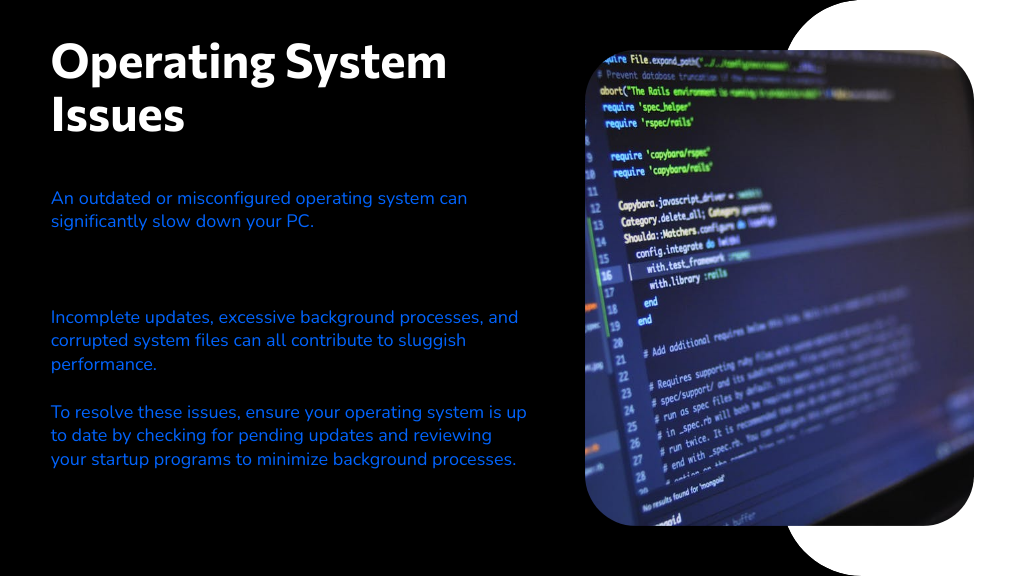
Although an outdated or misconfigured operating system can greatly slow down your PC, many users overlook this essential aspect. If you're wondering why your computer is so slow, it might be time to evaluate your OS settings. Windows 10 running slow can often be attributed to:
- Incomplete updates or patches
- Excessive background processes
- Corrupted system files
To resolve these issues, verify your operating system is up to date and check for any pending updates. Additionally, review your startup programs to minimize background processes that may be consuming resources. Running built-in troubleshooting tools can also help identify and fix corrupted files.
Overheating Components
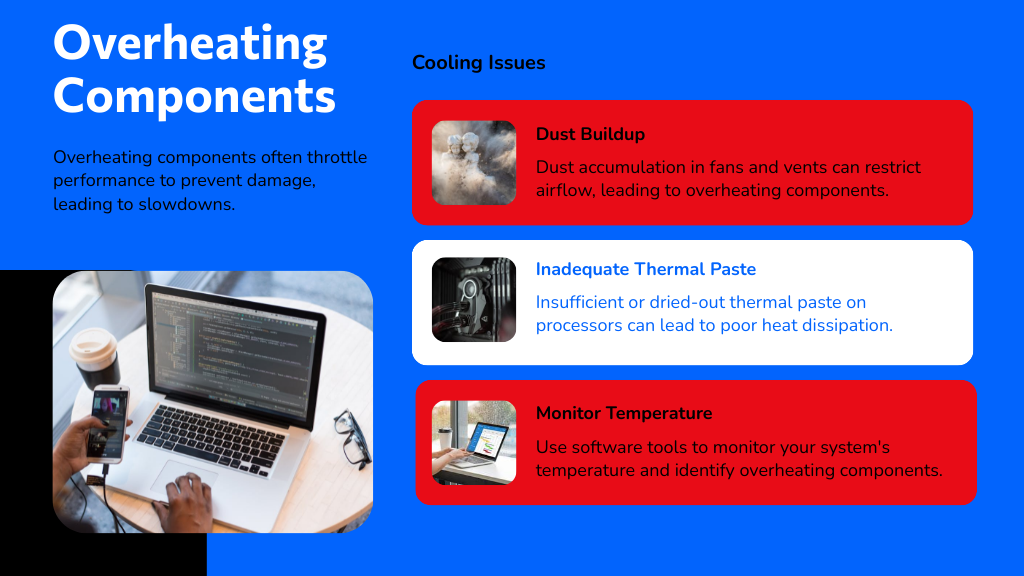
If your PC is running slow, overheating components could be a significant contributor to the problem. When the CPU or GPU overheats, they often throttle performance to prevent damage. This throttling leads to reduced processing power, causing your computer to lag.
Dust buildup in fans and vents can restrict airflow, exacerbating overheating components. Additionally, inadequate thermal paste on processors can lead to poor heat dissipation.
Monitoring your system's temperature with software tools can help you identify issues before they escalate. Regularly checking and cleaning your hardware can enhance cooling efficiency.
If you're wondering why is my computer so slow, addressing overheating components is essential for restoring peak performance and ensuring your system runs smoothly.
Lack of Regular Maintenance
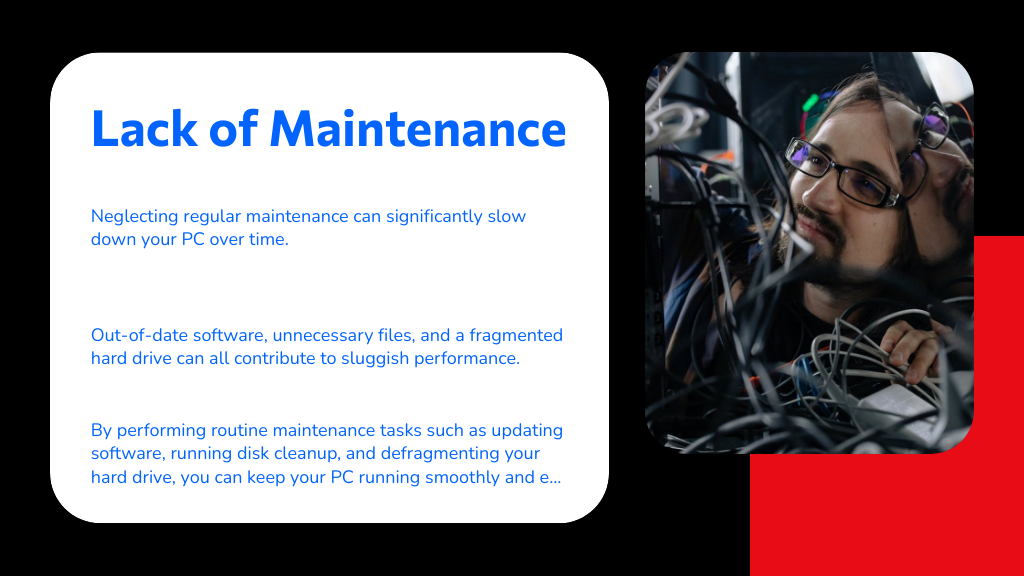
Neglecting regular maintenance can considerably slow down your PC over time. You might find yourself asking, why is my computer so slow? The answer often lies in the lack of routine care. Regular maintenance helps keep your system running smoothly and can prevent the need for slow PC repair.
Consider these essential maintenance tasks:
- Update software and drivers: Outdated programs can bog down performance.
- Run disk cleanup: Removing unnecessary files frees up valuable space.
- Defragment your hard drive: This can enhance data access speeds.
Conclusion

In summary, a slow PC can be a real thorn in your side, but you don't have to live with it. By addressing hardware limitations, software bloat, and regular maintenance, you can breathe new life into your machine. Keep an eye on those background processes and make certain your components aren't overheating. With a little effort, you'll have your computer running like a well-oiled machine, boosting your productivity and making your tasks feel less intimidating.


